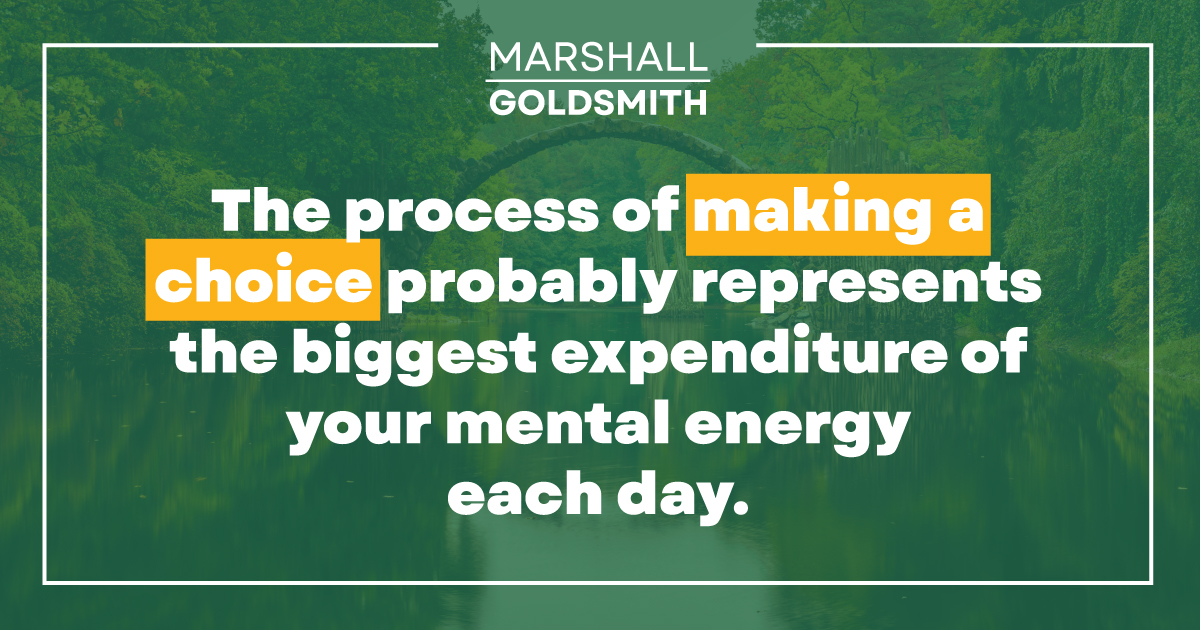Marshall Goldsmith Demonstrated How Avoiding Choices Makes You Efficient
Russian President Vladimir Putin’s choice to invade Ukraine has led to unexpected consequences. Marshall Goldsmith explores the consequences of choice.
Nashville, TN (Newsworthy.ai) Tuesday Jul 5, 2022 @ 9:00 AM PDT
In a blog post related to the difficulty of choice, adapted from his book The Earned Life, the renowned leadership coach and bestselling author Marshall Goldsmith On a purely personal level, choice can seem difficult — and even paralyzing. In a new blog post, Marshall Goldsmith, the renowned leadership expert and bestselling author, talks about this. He writes, “Some people love making choices—CEOs, film directors, and interior designers come to mind. They enjoy the power of giving a thumbs-up or -down to an acquisition, or the length of an actor’s hair, or the specific shade of gray for wall paint. I don’t. Perhaps you don’t either. Yet extensive research shows that the process of making a choice probably represents the biggest expenditure of your mental energy each day—and it leads to depletion, which can ultimately lead to bad decisions.”
“Some people love making choices. Research shows that making a choice represents the biggest expenditure of mental energy each day—and leads to depletion, and bad decisions.”

Russia made a choice in invading Ukraine, despite whatever reasons it gives publicly — it chose to invade a peaceful neighbor.
Now many of the world’s nations face difficult choices — engage with Russia to purchase oil and gas, or cut it off completely. Already many countries have chosen to cease doing business with Russia to protest its invasion. Just recently the Group of Seven (G7) nations agreed to phase out Russian oil imports. The G7 nations committed to the move "in a timely and orderly fashion" to put further pressure on President Vladimir Putin, although members such as resource-poor Japan depend heavily on Russian fuel and may move more slowly.
In The Earned Life Goldsmith uncovers the source of today’s existential crises, including regrets that stem from choices that irrevocably alter our lives, reroute destinies, and haunt our memories. These are particularly timely themes today.
With Goldsmith’s book as a guide, readers can close the gap between what they plan to achieve and what they actually get done—even in a world full of inescapable unfairness and curveballs—and live an earned life that is fulfilling in the long run.
You can read Marshall Goldsmith’s blog here.
About MARSHALL GOLDSMITH
Marshall Goldsmith has been recognized for years as the world’s leading executive coach and the New York Times bestselling author of many books, including What Got You Here Won’t Get You There, Mojo, and Triggers. He received his Ph.D. from the UCLA Anderson School of Management. In his coaching practice, Goldsmith has advised more than 200 major CEOs and their management teams. He and his wife live in Nashville, Tennessee.
About THE EARNED LIFE
In THE EARNED LIFE (Currency Books), Marshall Goldsmith uncovers the source of today’s existential crisis: regret, the kind stemming from choices that irrevocably alter our lives, reroutes destinies, and haunts our memories—particularly timely themes as the pandemic and Great Resignation inspire people to seek meaning in their lives, get unstuck and make changes. With this book as their guide, readers can close the gap between what they plan to achieve and what they actually get done—even in a world full of inescapable unfairness and curveballs—and live an earned life too fulfilling to dwell on the “what ifs.”
If you’d like more information on Marshall Goldsmith, The Earned Life, and his work, please get in touch with Lyda Goldsmith.
Other Recent News for Marshall Goldsmith
- Marshall Goldsmith Shows How to Deal with the Current World
- Marshall Goldsmith Shows How to Disengage from Your Past
- Marshall Goldsmith Shows How Good Habits Can Change Your Life
- Marshall Goldsmith Shows How to Plan to Create Goals
- Marshall Goldsmith Shows Why Support Is Essential for Growth
- Marshall Goldsmith Shows Why Empathy and Caring Are Necessary to a Full Life

